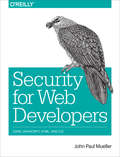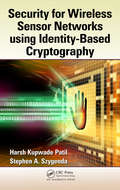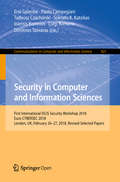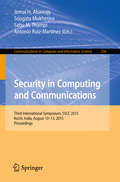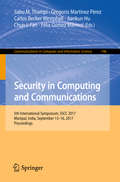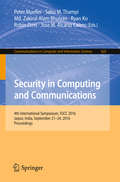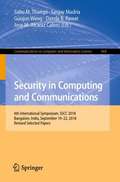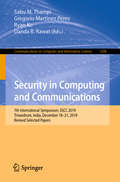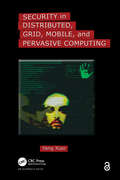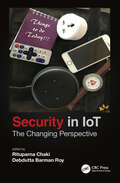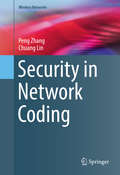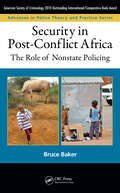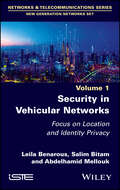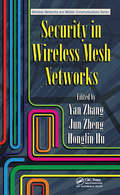- Table View
- List View
Security for Software Engineers
by James N. HelfrichSecurity for Software Engineers is designed to introduce security concepts to undergraduate software engineering students. The book is divided into four units, each targeting activities that a software engineer will likely be involved in within industry. The book explores the key areas of attack vectors, code hardening, privacy, and social engineering. Each topic is explored from a theoretical and a practical-application standpoint. Features: <P><P> Targets software engineering students - one of the only security texts to target this audience. <P><P> Focuses on the white-hat side of the security equation rather than the black-hat side. <P><P> Includes many practical and real-world examples that easily translate into the workplace. <P><P> Covers a one-semester undergraduate course. <P><P> Describes all aspects of computer security as it pertains to the job of a software engineer and presents problems similar to that which an engineer will encounter in the industry. <P><P> This text will equip students to make knowledgeable security decisions, be productive members of a security review team, and write code that protects a user’s information assets.
Security for Web Developers: Using JavaScript, HTML, and CSS
by John Paul MuellerAs a web developer, you may not want to spend time making your web app secure, but it definitely comes with the territory. This practical guide provides you with the latest information on how to thwart security threats at several levels, including new areas such as microservices. You’ll learn how to help protect your app no matter where it runs, from the latest smartphone to an older desktop, and everything in between.Author John Paul Mueller delivers specific advice as well as several security programming examples for developers with a good knowledge of CSS3, HTML5, and JavaScript. In five separate sections, this book shows you how to protect against viruses, DDoS attacks, security breaches, and other nasty intrusions.Create a security plan for your organization that takes the latest devices and user needs into accountDevelop secure interfaces, and safely incorporate third-party code from libraries, APIs, and microservicesUse sandboxing techniques, in-house and third-party testing techniques, and learn to think like a hackerImplement a maintenance cycle by determining when and how to update your application softwareLearn techniques for efficiently tracking security threats as well as training requirements that your organization can use
Security for Wireless Implantable Medical Devices
by Xiali Hei Xiaojiang DuIn the treatment of chronic diseases, wireless Implantable Medical Devices (IMDs) are commonly used to communicate with an outside programmer (reader). Such communication raises serious security concerns, such as the ability for hackers to gain access to a patient's medical records. This brief provides an overview of such attacks and the new security challenges, defenses, design issues, modeling and performance evaluation in wireless IMDs. While studying the vulnerabilities of IMDs and corresponding security defenses, the reader will also learn the methodologies and tools for designing security schemes, modeling, security analysis, and performance evaluation, thus keeping pace with quickly-evolving wireless security research.
Security for Wireless Sensor Networks using Identity-Based Cryptography
by Harsh Kupwade Patil Stephen A. SzygendaSecurity for Wireless Sensor Networks using Identity-Based Cryptography introduces identity-based cryptographic schemes for wireless sensor networks. It starts with an exhaustive survey of the existing layered approach to WSN security-detailing its pros and cons. Next, it examines new attack vectors that exploit the layered approach to security.Aft
Security in Computer and Information Sciences: First International ISCIS Security Workshop 2018, Euro-CYBERSEC 2018, London, UK, February 26-27, 2018, Revised Selected Papers (Communications in Computer and Information Science #821)
by Erol Gelenbe Sokratis K. Katsikas Tadeusz Czachórski Paolo Campegiani Ioannis Komnios Luigi Romano Dimitrios TzovarasThis open access book constitutes the thoroughly refereed proceedings of the First International ISCIS Security Workshop 2018, Euro-CYBERSEC 2018, held in London, UK, in February 2018. The 12 full papers presented together with an overview paper were carefully reviewed and selected from 31 submissions. Security of distributed interconnected systems, software systems, and the Internet of Things has become a crucial aspect of the performance of computer systems. The papers deal with these issues, with a specific focus on societally critical systems such as health informatics systems, the Internet of Things, energy systems, digital cities, digital economy, mobile networks, and the underlying physical and network infrastructures.
Security in Computer and Information Sciences: Second International Symposium, EuroCybersec 2021, Nice, France, October 25–26, 2021, Revised Selected Papers (Communications in Computer and Information Science #1596)
by Erol Gelenbe Marija Jankovic Dionysios Kehagias Anna Marton Andras VilmosThis open access book constitutes the thoroughly refereed proceedings of the Second International Symposium on Computer and Information Sciences, EuroCybersec 2021, held in Nice, France, in October 2021.The 9 papers presented together with 1 invited paper were carefully reviewed and selected from 21 submissions. The papers focus on topics of security of distributed interconnected systems, software systems, Internet of Things, health informatics systems, energy systems, digital cities, digital economy, mobile networks, and the underlying physical and network infrastructures.This is an open access book.
Security in Computing and Communications
by Jemal H. Abawajy Sougata Mukherjea Sabu M. Thampi Antonio Ruiz-MartínezThis book constitutes the refereed proceedings of the International Symposium on Security in Computing and Communications, SSCC 2015, held in Kochi, India, in August 2015. The 36 revised full papers presented together with 13 short papers were carefully reviewed and selected from 157 submissions. The papers are organized in topical sections on security in cloud computing; authentication and access control systems; cryptography and steganography; system and network security; application security.
Security in Computing and Communications
by Carlos Becker Westphall Sabu M. Thampi Gregorio Martínez Pérez Jiankun Hu Chun I. Fan Félix Gómez MármolThis book constitutes the refereed proceedings of the International Symposium on Security in Computing and Communications, SSCC 2013, held in Mysore, India, in August 2013. The 24 revised full papers presented together with 15 poster papers were carefully reviewed and selected from 111 submissions. The papers cover all aspects of secure computing and communication in networking and distributed systems such as cloud-based data centers.
Security in Computing and Communications
by Peter Mueller Jose M. Alcaraz Calero Robin Doss Ryan Ko Sabu M. Thampi Md Zakirul Alam BhuiyanThis book constitutes the refereed proceedings of the International Symposium on Security in Computing and Communications, SSCC 2013, held in Mysore, India, in August 2013. The 24 revised full papers presented together with 15 poster papers were carefully reviewed and selected from 111 submissions. The papers cover all aspects of secure computing and communication in networking and distributed systems such as cloud-based data centers.
Security in Computing and Communications: 6th International Symposium, SSCC 2018, Bangalore, India, September 19–22, 2018, Revised Selected Papers (Communications in Computer and Information Science #969)
by Jose M. Alcaraz Calero Danda B. Rawat Sanjay Madria Sabu M. Thampi Guojun WangThis book constitutes the refereed proceedings of the 6th International Symposium on Security in Computing and Communications, SSCC 2018, held in Bangalore, India, in September 2018. The 34 revised full papers and 12 revised short papers presented were carefully reviewed and selected from 94 submissions. The papers cover wide research fields including cryptography, database and storage security, human and societal aspects of security and privacy.
Security in Computing and Communications: 7th International Symposium, SSCC 2019, Trivandrum, India, December 18–21, 2019, Revised Selected Papers (Communications in Computer and Information Science #1208)
by Danda B. Rawat Ryan Ko Sabu M. Thampi Gregorio Martinez PerezThis book constitutes the refereed proceedings of the 7th International Symposium on Security in Computing and Communications, SSCC 2019, held in Trivandrum, India, in December 2019. The 22 revised full papers and 7 revised short papers presented were carefully reviewed and selected from 61 submissions. The papers cover wide research fields including cryptography, database and storage security, human and societal aspects of security and privacy.
Security in Computing and Communications: 8th International Symposium, SSCC 2020, Chennai, India, October 14–17, 2020, Revised Selected Papers (Communications in Computer and Information Science #1364)
by Danda B. Rawat Ryan Ko Sabu M. Thampi Guojun Wang Chun-I FanThis book constitutes revised selected papers of the 8th International Symposium on Security in Computing and Communications, SSCC 2020, held in Chennai, India, in October 2020. Due to the COVID-19 pandemic the conference was held online. The 13 revised full papers and 8 revised short papers presented were carefully reviewed and selected from 42 submissions. The papers cover wide research fields including cryptography, database and storage security, human and societal aspects of security and privacy.
Security in Distributed, Grid, Mobile, and Pervasive Computing
by Yang XiaoThis book addresses the increasing demand to guarantee privacy, integrity, and availability of resources in networks and distributed systems. It first reviews security issues and challenges in content distribution networks, describes key agreement protocols based on the Diffie-Hellman key exchange and key management protocols for complex distributed systems like the Internet, and discusses securing design patterns for distributed systems. The next section focuses on security in mobile computing and wireless networks. After a section on grid computing security, the book presents an overview of security solutions for pervasive healthcare systems and surveys wireless sensor network security.
Security in Embedded Devices
by Catherine H. GebotysAlthough security is prevalent in PCs, wireless communications and other systems today, it is expected to become increasingly important and widespread in many embedded devices. For some time, typical embedded system designers have been dealing with tremendous challenges in performance, power, price and reliability. However now they must additionally deal with definition of security requirements, security design and implementation. Given the limited number of security engineers in the market, large background of cryptography with which these standards are based upon, and difficulty of ensuring the implementation will also be secure from attacks, security design remains a challenge. This book provides the foundations for understanding embedded security design, outlining various aspects of security in devices ranging from typical wireless devices such as PDAs through to contactless smartcards to satellites.
Security in Fixed and Wireless Networks
by Guenter Schaefer Michael RossbergIntroduces aspects on security threats and their countermeasures in both fixed and wireless networks, advising on how countermeasures can provide secure communication infrastructures. Enables the reader to understand the risks of inappropriate network security, what mechanisms and protocols can be deployed to counter these risks, and how these mechanisms and protocols work.
Security in IoT-Enabled Spaces
by Fadi Al-TurjmanSecurity and smart spaces are among the most significant topics in IoT nowadays. The implementation of secured smart spaces is at the heart of this concept, and its development is a key issue in the next generation IoT. This book addresses major security aspects and challenges in realizing smart spaces and sensing platforms in critical Cloud and IoT applications. The book focuses on both the design and implementation aspects of security models and strategies in smart that are enabled by wireless sensor networks and RFID systems. It mainly examines seamless data access approaches and encryption and decryption aspects in reliable IoT systems.
Security in IoT: The Changing Perspective
by Rituparna Chaki Debdutta Barman RoyThe diverse applications of IoT are achieved by a set of complex inter-related networks of things and communications. IoT applications are also concerned about an array of devices such as sensors, mobile devices, personal computers, the smart systems such as Alexa, Eco, etc, besides the whole range of communication network binding them together in a seamless manner. This book explores the variegated perspectives of security in the complex context of Internet of Things. It also aims to present the changing face of security, from the ubiquitous networks comprising of WSN as the lowest layer, to the enabler apps working as bridge between the users and the complex IoT system. It takes a closer look at the different types of security schemes required to fit in the heterogeneous nature of IoT network., whilst the readers are also introduced to basic attacks targeting an IoT network, as well as specific types of security schemes worked out by researchers across different countries. As Programmable Logic Controllers (PLC) play a fundamental role in Industrial Control Systems, since they provide various functionalities of physical tools by collecting data from input devices and sending commands to output devices, this book includes a discussion on the security considerations of extending a PLC-based system with IoT capabilities. Other advanced topics include: The machine ethics aspects in the IoT system; the Intrusion detection of WSN; and the methods of securing the user from privacy breaches due to the overprivileged IoT apps. This book will be beneficial to any readers interested in security of IoT systems and how to develop a layer-wise security scheme for such a system.
Security in Network Coding
by Peng Zhang Chuang LinThis book covers a series of security and privacy issues in network coding, and introduces three concrete mechanisms to address them. These mechanisms leverage traditional cryptographic primitives and anonymous protocols, and are redesigned to fit into the new framework of network coding. These three mechanisms are MacSig, a new message authentication method for network-coded systems; P-Coding, a new encryption scheme to secure network-coding-based transmissions; and ANOC, a new anonymous routing protocol that seamlessly integrates anonymous routing with network coding. Along with these three mechanisms, the authors provide a review of network coding's benefits, applications, and security problems. Also included is a detailed overview of security issues in the field, with an explanation of how the security issues differ from those in traditional settings. While network coding can help improve network performance, the adoption of network coding can be greatly limited unless security and privacy threats are addressed. Designed for researchers and professionals, Security in Network Coding explores major challenges in network coding and offers practical solutions. Advanced-level students studying networking or system security will also find the content valuable.
Security in Post-Conflict Africa: The Role of Nonstate Policing (Advances in Police Theory and Practice)
by Bruce BakerPolicing is undergoing rapid change in Africa as a result of democratization, the commercialization of security, conflicts that disrupt policing services, and peace negotiations among former adversaries. These factors combined with the inability of Africa‘s state police to provide adequate protection have resulted in the continuing popularity of va
Security in RFID and Sensor Networks
by Paris Kitsos Yan ZhangIn the past several years, there has been an increasing trend in the use of Radio Frequency Identification (RFID) and Wireless Sensor Networks (WSNs) as well as in the integration of both systems due to their complementary nature, flexible combination, and the demand for ubiquitous computing. As always, adequate security remains one of the open are
Security in Sensor Networks
by Yang XiaoSensor networks differ from traditional networks in many aspects including their limited energy, memory space, and computational capability. These differentiators create unique security vulnerabilities. Security in Sensor Networks covers all aspects of the subject, serving as an invaluable reference for researchers, educators, and practition
Security in Smart Cities: Models, Applications, and Challenges (Lecture Notes in Intelligent Transportation and Infrastructure)
by Syed Hassan Ahmed Aboul Ella Hassanien Amit Kumar Singh Mohamed ElhosenyThis book offers an essential guide to IoT Security, Smart Cities, IoT Applications, etc. In addition, it presents a structured introduction to the subject of destination marketing and an exhaustive review on the challenges of information security in smart and intelligent applications, especially for IoT and big data contexts. Highlighting the latest research on security in smart cities, it addresses essential models, applications, and challenges.Written in plain and straightforward language, the book offers a self-contained resource for readers with no prior background in the field. Primarily intended for students in Information Security and IoT applications (including smart cities systems and data heterogeneity), it will also greatly benefit academic researchers, IT professionals, policymakers and legislators. It is well suited as a reference book for both undergraduate and graduate courses on information security approaches, the Internet of Things, and real-world intelligent applications.
Security in Smart Home Networks (Wireless Networks)
by Haojin Zhu Xuemin (Sherman) Shen Yan MengThis book presents the security and privacy challenges of the smart home following the logic of “terminal device – voice interface – application platform”. For each component, the authors provide answers to the three questions: 1) In the terminal device layer, how to conduct cross-layer privacy breach analysis and provide effective countermeasures; 2) In the voice interface layer, how to design effective and lightweight schemes to defend against voice spoofing; 3) In the application layer, how to design an effective anomaly detection system without breaching the application platform. The authors conduct a thorough analysis of the security threats and challenges in each component of the smart home, review the existing state-of-the-art solutions proposed by other researchers, and elaborate on proposed countermeasures. This book aims to provide both security threats analysis and state-of-the-art countermeasures for the smart home network.
Security in Vehicular Networks: Focus on Location and Identity Privacy
by Abdelhamid Mellouk Leila Benarous Salim BatimVehicular networks were first developed to ensure safe driving and to extend the Internet to the road. However, we can now see that the ability of vehicles to engage in cyber-activity may result in tracking and privacy violations through the interception of messages, which are frequently exchanged on road. This book serves as a guide for students, developers and researchers who are interested in vehicular networks and the associated security and privacy issues. It facilitates the understanding of the technologies used and their various types, highlighting the importance of privacy and security issues and the direct impact they have on the safety of their users. It also explains various solutions and proposals to protect location and identity privacy, including two anonymous authentication methods that preserve identity privacy and a total of five schemes that preserve location privacy in the vehicular ad hoc networks and the cloud-enabled internet of vehicles, respectively. This book also presents a new privacy-aware blockchain-based pseudonym management framework.Vehicular networks were first developed to ensure safe driving and to extend the Internet to the road. However, we can now see that the ability of vehicles to engage in cyber-activity may result in tracking and privacy violations through the interception of messages, which are frequently exchanged on road. This book serves as a guide for students, developers and researchers who are interested in vehicular networks and the associated security and privacy issues. It facilitates the understanding of the technologies used and their various types, highlighting the importance of privacy and security issues and the direct impact they have on the safety of their users. It also explains various solutions and proposals to protect location and identity privacy, including two anonymous authentication methods that preserve identity privacy and a total of five schemes that preserve location privacy in the vehicular ad hoc networks and the cloud-enabled internet of vehicles, respectively. This book also presents a new privacy-aware blockchain-based pseudonym management framework. Leila
Security in Wireless Mesh Networks (Wireless Networks And Mobile Communications Ser.)
by Yan Zhang Jun Zheng Honglin HuWireless mesh networks (WMN) encompass a new area of technology set to play an important role in the next generation wireless mobile networks. WMN is characterized by dynamic self-organization, self-configuration, and self-healing to enable flexible integration, quick deployment, easy maintenance, low costs, high scalability, and reliable services.

